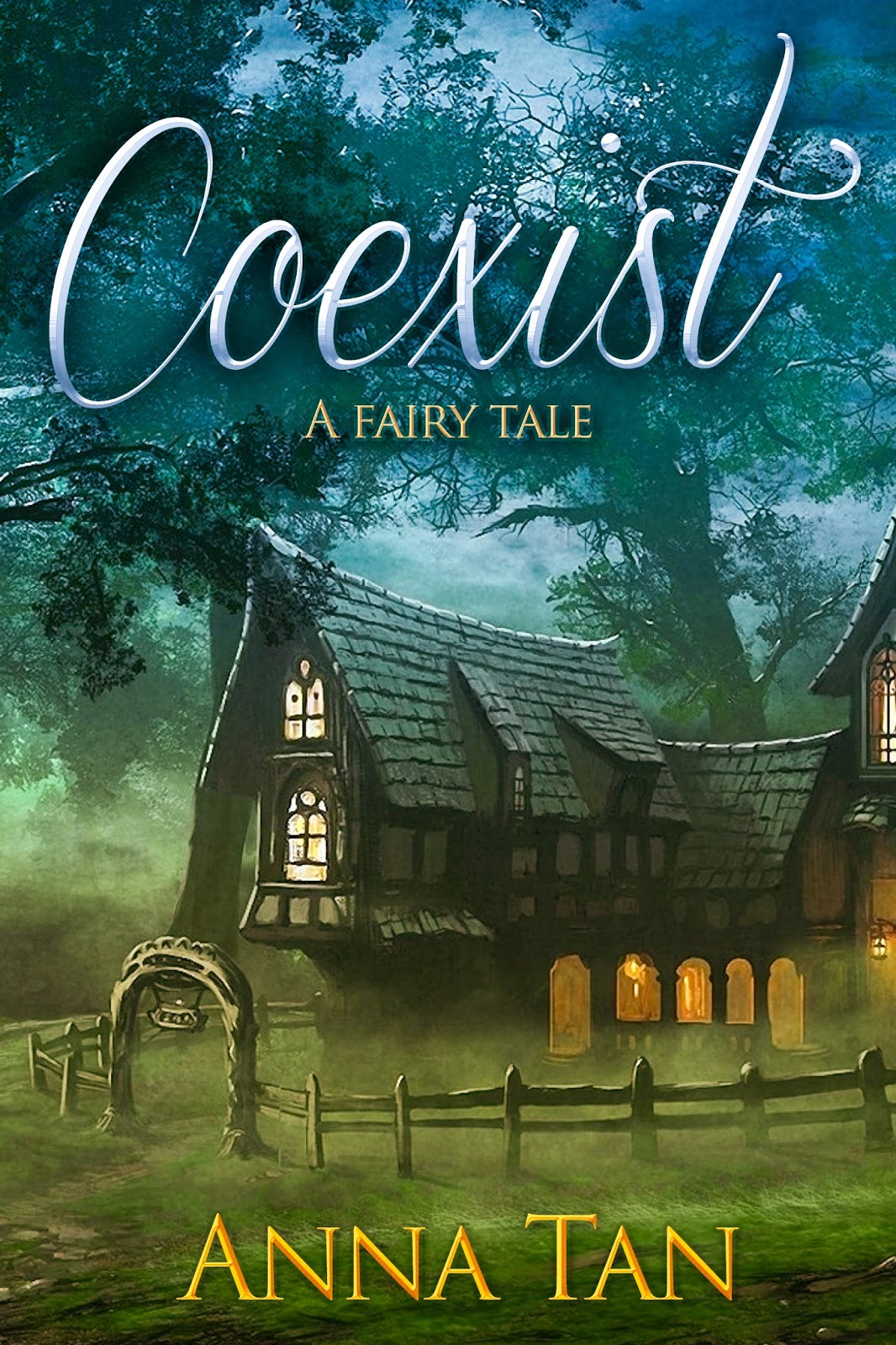I am very excited to welcome Anna Tan to my blog today. She and I connected several years ago (through either the A-Z Blogging Challenge, or the Writers Platform Building Campaign, I can’t remember which!) and she has recently published her novella – Coexist. I have read it, and it is excellent, and my review will be up next week.
Anna and I are of similar minds when it comes to how our writing and faith entwine – especially since both of us prefer to write fantasy, and so I hope you enjoy this post! Make sure you hang out until the end for some goodies!
Faith, Fantasy and changing the world, one story at a time.
‘Mythologies… are products of imagination in the sense that their content is imaginative. The more imaginative ones are “near the mark” in the sense that they communicate more Reality to us.’
C. S. Lewis, Personal letter
If I were to point at one writer that has influenced me the most, I would have to point to CS Lewis. Partially because I attribute my start to writing to The Horse and His Boy, but also because I admire the way he weaves his faith into the Chronicles of Narnia and the Space Trilogy. As I grew older, some of these became painfully obvious, in the way that people dismiss his stories as “allegory,” but on a child’s level, it was beautiful and eye-opening, a window into understanding the world – and spiritual truths – through story.
Not everyone understands this. My mother doesn’t quite understand fantasy stories, even though she’d faithfully bought us fairy tales growing up. The Enid Blyton books were easy to explain – they often had a moral behind them, or at least a message, even if that message was that it was important to learn how to tell the time. The Chronicles of Narnia were a little harder, but behind it she could see the Christian allegory, so it was something that she could understand, if only a little.
This didn’t really solidify for me until I read John Piper’s book, Seeing Beauty and Saying Beautifully, where Piper says, “Likening some aspect of reality to what it is not can reveal more of what it is… Part of what makes Lewis so illuminating on almost everything he touches is his unremitting rational clarity and his pervasive use of likening. Metaphor, analogy, illustration, simile, poetry, story, myth—all of these are ways of likening aspects of reality to what it is not, for the sake of showing more deeply what it is.”
Tales of the fantastical don’t have to set out to teach us anything, but often they open our eyes to see things beyond our own petty concerns. I learnt about honor and integrity from Narnia and many of the epic fantasy stories of old. They don’t set out to say that “this is a story of honor” but they show you what it looked like – or at least what they thought it should look like, when men were chivalrous and meant what they said. They also showed you the villains and how you could never trust a person who would twist words for their own ends.
Of course, old stories have their own problems which are part of current literary debate – how it revolves around male patriarchy and privilege, how women and people of color are unrepresented, under represented, or wrongly presented. I cannot fault them – people often write what they know, and in those times, in those days, that was what they knew and understood. Part of the problem (as relates to people of color, at least) is the fact that our stories have been written in our own [foreign] tongues and have not (or not yet) been translated into English – yet we are arguing representation for a transplanted people in an adopted language and culture. [I am part of the problem. I do not speak or write my own language. I should, but I don’t.] So, as writers, we can still do better. We can still write better.
But fantasy worlds help you understand the world better, usually because it breaks down the easy demarcations of “us vs them,” making everything into an other, stripping away the familiarity of things that we claim to be right and proper. It breaks you out of your mold of thinking this is what it is by helping you envision this is how it could be – and that is invaluable. In a world that is constantly changing, we need stories to tell us how we should behave as humans, even as we need stories to remind us of what we have done and how it has ended. We need stories that foretell what will happen if we do not change our ways, as well as those that show us a better way to live, a better way to communicate, a better way to pursue truth, beauty and justice.
In The Weight of Glory, a book I have yet to read, but have often seen quotes from, CS Lewis says,
“The books or the music in which we thought the beauty was located will betray us if we trust to them; it was not in them, it only came through them, and what came through them was longing. These things—the beauty, the memory of our own past—are good images of what we really desire; but if they are mistaken for the thing itself, they turn into dumb idols, breaking the hearts of their worshipers. For they are not the thing itself; they are only the scent of a flower we have not found, the echo of the tune we have not heard, news from a country we have never yet visited.”
In writing Coexist, I was trying to revisit the beauty of fairy tales I grew up with, putting it in juxtaposition against the darker tales that we now tell ourselves. I understand the need to explore the deeper, darker, more complex sides of our humanity, but I also believe in the need to give us good heroes to aspire to, as well as a glimpse of a better and brighter future that we can create.
Jane isn’t so much a hero, as she is someone who is being awakened to the beauty of the fantastic, just as we are. And if you were able to glimpse a piece of that beauty, I have done my job right.
About the book:
 Jane Hays has been told all her life that it’s dangerous to be out in the forest past sundown. At fifteen, she’s quite sure that it’s all old wives’ tales… yet, why does her village bar the gates every night? Why do they even have gates? When she is caught in an unexpected rainstorm on her way home, Jane ignores all the warnings and seeks shelter in a cottage in the middle of the forest. Soon, she is caught up in a world of magic and beauty – and in the storm of the Fairy Queen’s wrath.
Jane Hays has been told all her life that it’s dangerous to be out in the forest past sundown. At fifteen, she’s quite sure that it’s all old wives’ tales… yet, why does her village bar the gates every night? Why do they even have gates? When she is caught in an unexpected rainstorm on her way home, Jane ignores all the warnings and seeks shelter in a cottage in the middle of the forest. Soon, she is caught up in a world of magic and beauty – and in the storm of the Fairy Queen’s wrath.
The Fairy Queen is out for blood. There have been intruders – human intruders – in her domain and she will stop at nothing to find them and kill them. After all, it is only fair. She is only seeking retribution for the death that humans leave in their wake.
But Jane isn’t all that she seems to be. And the events of the night aren’t as innocent as they appear.
A tale of magic, fairy creatures and family, Coexist is a novella for the young and the young-at-heart.
Get Coexist on Amazon or Smashwords.
Readers! Anna is offering a special coupon code for 50% off of Coexist on Smashwords. ZM78D is good until May 7, 2016.
About the Author:
 Anna Tan grew up in Malaysia, the country that is not Singapore. In 2015, she traded in a life of annoying other bean counters for one of annoying the online world with questions about life and death and everything in between. The answer is sometimes 42.
Anna Tan grew up in Malaysia, the country that is not Singapore. In 2015, she traded in a life of annoying other bean counters for one of annoying the online world with questions about life and death and everything in between. The answer is sometimes 42.
When she is not writing or nitpicking over other writers’ copy, she can be found reading a book or attempting to organise her room.
She can be found lurking at the following places:
Website | Blog | Facebook | Twitter | Instagram | Goodreads
PRIZES!

Anna Tan (@natzers)
April 2, 2016 - 1:37 am ·Thank you for hosting me! 🙂
I don’t remember which event it was – maybe both!